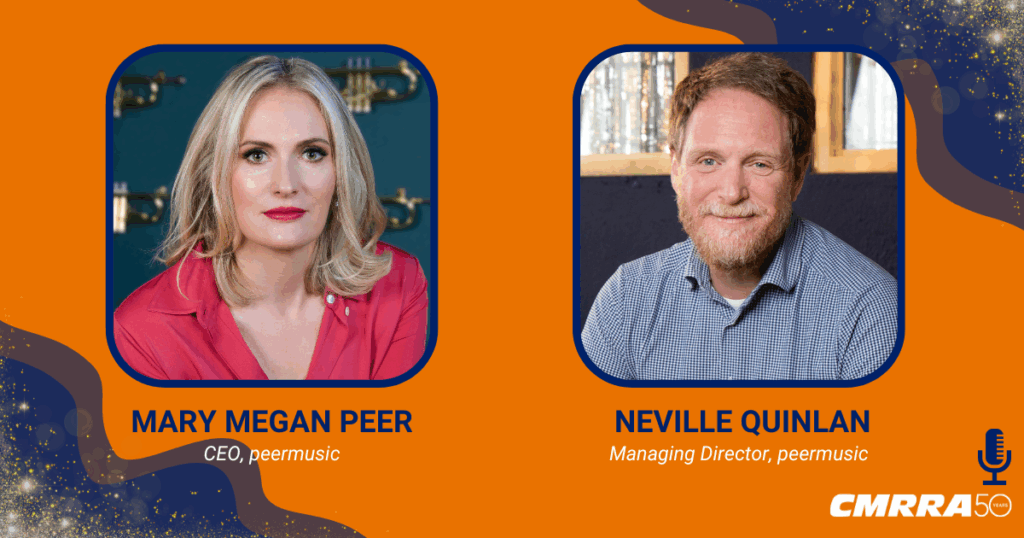
By Isabelle Speerin
From the dawn of broadcast mechanicals to driving the strategic partnership with SoundExchange, peermusic Canada’s Neville Quinlan has supported CMRRA through some of its most defining moments during his twenty-year tenure on the board. In a recent interview, Quinlan and global peermusic CEO, Mary Megan Peer, offered a rare glimpse into the key milestones that shaped CMRRA, shedding light on the agency’s evolution and impact.
The story begins almost a century ago, when Ralph S. Peer, the founder of peermusic, established a musical empire by mining for publishing gold where few thought to look. He first discovered southern music and blues in the 1920s, with Latin and rock and roll to follow in later decades.
Today, peermusic has grown into the world’s largest global independent music publishing and neighbouring rights company, with 39 offices in 32 countries, including a presence in Canada since the 1940s. The company remains family owned and operated, with Ralph S. Peer’s granddaughter, Mary Megan Peer, now CEO.
Few people realize that peermusic’s involvement with CMRRA dates to the agency’s founding in 1975. “Our managing director at the time, Matthew Heft, was part of the team that helped establish and support CMRRA in the early days,” Quinlan revealed. The close relationship continues today, with Quinlan currently chairing the Canadian Publisher Committee (CPC).
“When I joined CMRRA’s board in 2002, we were exploring new income lines, including the broadcast mechanical,” Quinlan recalls. At the time, the concept of broadcast mechanicals, which compensate songwriters and music publishers for the reproduction of their music in commercial radio broadcasts, only existed in Europe. CMRRA worked with industry partners to successfully advocate for this right to the Copyright Board of Canada. “Securing broadcast mechanicals was a major achievement for CMRRA, helping to offset declines in physical sales during the transition to the digital economy,” he said. “It was our first foray into tariff applications and government.” The tariff has since generated more than $150 million in royalties.
Another turning point Quinlan recalls was in the early 2010s when CMRRA played a pivotal role in helping to define the settlement terms of a class action lawsuit against the major labels for undistributed pending list royalties. These terms included the creation of a portal to support the identification and claims by rights holders of unlicensed shares of musical works. CMRRA then undertook the administration, and systems support necessary to properly manage the claims portal and other distribution components associated with the settlement. Quinlan noted that by publishing the pending lists, CMRRA demonstrated its commitment to engaging with the marketplace to identify and compensate the correct rights holders. “I think so much of the industry is better served by transparency more than one would think,” he said. “Transparency prevents mistrust, and it really helped to establish CMRRA as a trusted partner to the music ecosystem.”
The acquisition of CMRRA by SoundExchange in 2017 was overseen by the organization’s senior leadership team, with input from its internal Publisher Committee, chaired by Quinlan with a strong focus on preserving CMRRA’s Canadian footprint and culture. “We leveraged relationships and sought a partner who would uphold CMRRA’s forward-thinking mentality,” Quinlan explained. The sale attracted interest from societies and agencies worldwide. SoundExchange ticked all the boxes, standing out for its commitment to maintaining a direct relationship between CMRRA’s clients and management. “SoundExchange’s team was open, forward-thinking, and bullish, making them the ideal partner,” he noted.
With the support of SoundExchange, both Peer and Quinlan have witnessed CMRRA’s steadfast commitment to providing the technological resources required in this digital age, where agencies must manage increasingly complex data systems. “I’ve noticed a real dedication to providing the tech resources that are so important as we’re dealing with exponentially increasing volumes of data, having the systems that can process it, and the in-house expertise from a data science perspective to ensure that everything is accurate,” Mary Megan Peer shared. “I think it’s notable that CMRRA has continued to make this a priority for the industry.”
While Quinlan acknowledges Canada is a smaller market, he points out that peermusic maintains a presence here due to the country’s powerhouse of creative talent. “CMRRA has been very important to peermusic as an independent publisher in this marketplace where we rely on our partners to help us function efficiently,” he said. “We want to spend less time chasing licences and payments and more time nurturing our writers and artists to grow their careers. We rely on CMRRA to handle the difficult, time-consuming tasks that require significant infrastructure investments, and to develop innovative solutions for licensing and collecting royalties, as that alone demands considerable resources.”
Peer echoed these sentiments, highlighting CMRRA’s forward-thinking approach. “From my perspective, CMRRA was the precursor to the Mechanical Licensing Collective (MLC) in many ways,” Peer said. “For forty-five years before the MLC came into existence, CMRRA has been ahead of the curve, willing to be a technology-forward agency and use technology to improve distribution, establish user-friendly portals that enable rights holders to claim royalties on a work share basis.”
Looking ahead, Neville Quinlan emphasizes the importance of CMRRA’s role in the music ecosystem. “As the industry gets more complicated, it’s increasingly important to have the support of an organization like CMRRA and specialists in the administration of all types of royalties to help us navigate and grow,” he said. “We need CMRRA to help us overcome future challenges and listen to the entire community.”
Quinlan says the agency’s ability to recognize and listen to its membership remains a large part of its legacy. “CMRRA has been incredibly responsive to clients, and competent in licensing over the past 20 years. Their work, while often behind the scenes, is essential and underappreciated, and I’m so pleased to see them recognized as a trusted partner in the industry, especially as they celebrate their 50-year anniversary.”
Learn more about peermusic here.


